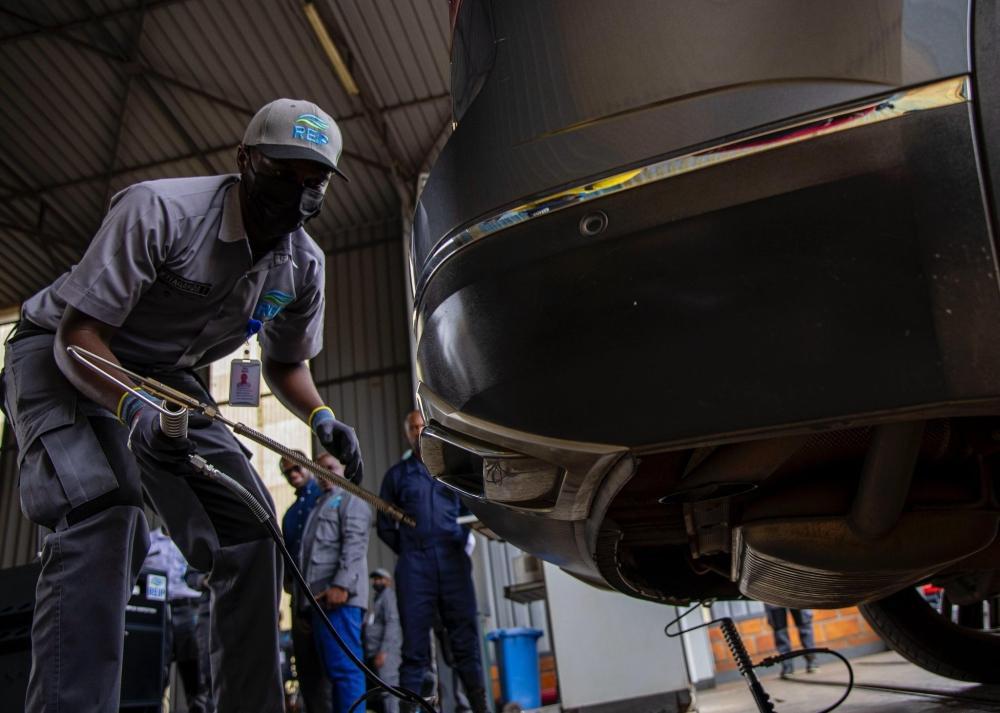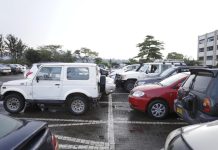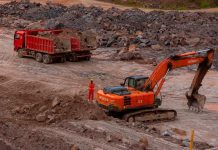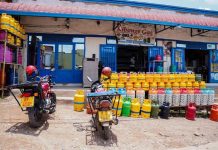Africa-Press – Rwanda. After one in five vehicles tested for emissions in Rwanda were found to exceed the required pollution limits, garage workers in Kigali said they received a growing number of vehicle owners seeking repairs.
Between August 25 and October 31, the Rwanda Environment Management Authority (REMA) tested 9,118 vehicles, of which 22.6 per cent emitted pollutants beyond acceptable standards.
Jean-Félix Muhirwa, the Workshop Manager at ATECAR Garage in Kicukiro District, said they have begun receiving vehicles that failed the new emission tests, most of them being trucks.
“In most cases, emissions come from poor maintenance, such as damaged air filters that no longer clean properly, or faulty carburetors. Sometimes, the problem is a worn-out engine that releases excess smoke,” Muhirwa told The New Times.
He noted that since the emissions testing began in late August, the garage now handles at least three vehicles a week with emission issues.
“Besides trucks that have failed the tests, some private car owners also bring their vehicles voluntarily after noticing unusual smoke,” he said.
“Before these tests started, we used to receive one or two small cars per month with similar problems.”
According to Muhirwa, each vehicle goes through a careful inspection by skilled technicians using diagnostic machines to measure pollutant levels.
Repairs then focus on key areas such as oil changes, air and fuel filter replacements, and ensuring the correct type of fuel is used.
“Sometimes it’s just about proper servicing, changing oil and filters on time,” he said. “But if the engine or major parts are damaged, costs can rise significantly.”
The cost of repairs
Repair costs, he added, vary depending on the cause and vehicle type.
“Some repairs can cost between Rwf1.5 million and Rwf3 million if major components need replacement,” he said.
“In other cases, it might just require tightening or minor adjustments costing Rwf10,000 to Rwf20,000. Air filters alone range from Rwf35,000 to Rwf65,000, depending on the model.”
Muhirwa advised motorists to maintain regular servicing schedules to avoid costly repairs and keep their vehicles environmentally compliant.
“Timely maintenance is key,” he emphasised. “It’s not only about passing the test but also about reducing pollution and extending your vehicle’s lifespan.”
Shaffy Gaston Byiringiro, the Managing Director of Gastons Auto Team, another garage based in Kicukiro District, offered a more technical perspective.
“When a vehicle fails the emission test, we start by checking the air-fuel balance and compression, that tells us right away whether the problem is electronic, like sensors, injectors or Electronic Control Unit (ECU) readings, or mechanical, such as engine wear or oil burning,” he explained.
“Most failures come from engines running rich, that is it’s receiving too much fuel, not enough air, or from vehicles burning oil due to weak piston rings or valve seals. Once diagnostics confirm the source, we clean or replace the necessary parts, reset the ECU, and road-test the car under real driving conditions to ensure a clean burn.”
Byiringiro said repair costs depend on how deep the issue goes. Basic sensor or air filter problems may cost between Rwf50,000 and Rwf120,000, while fuel system recalibration and injector services range from Rwf100,000 to Rwf250,000. More complex cases involving engine compression loss or valve damage can exceed Rwf400,000.
“The biggest difference is between temporary fixes and proper mechanical restoration,” he said.
“We insist on the latter, even if it costs more, because it solves the root cause.”
Since the inspection campaign began in late August, Gastons Auto Team has recorded a 40 to 50 per cent increase in emission-related visits, mainly from older imports, particularly 2000–2012 Toyotas and Nissans, with worn catalytic converters and poor maintenance records.
Byiringiro said the most common causes include poor engine compression and oil blow-by, failing catalytic converters, faulty oxygen sensors, exhaust gas recirculation valves blocked by carbon deposits, and prolonged use of low-quality fuel coupled with irregular oil changes.
He believes Rwanda’s inspection drive is not just a technical challenge but also a matter of driver awareness.
“Emissions are as much about behaviour as mechanics. Many owners delay servicing. The real fix lies in educating both drivers and garages about diagnostics, combustion tuning, and fuel quality.”
How much is the emissions test?
Emissions testing will be carried out alongside regular mechanical inspections once or twice a year, depending on how often a vehicle is used, according to REMA.
Testing fees vary by vehicle category. Motorcycles’ price is Rwf16,638 for the first test and Rwf8,319 for reinspection within two weeks. Private cars with up to eight seats and a maximum authorised weight of 3.5 tonnes pay Rwf34,940 for the first test and Rwf17,470 for reinspection.
Larger passenger and goods vehicles, ranging from minibuses to heavy-duty trucks, pay Rwf51,578 for the first test and Rwf25,789 for reinspection.
Other vehicle types not specifically listed will be charged Rwf49,914 and Rwf24,957 respectively.
For More News And Analysis About Rwanda Follow Africa-Press






